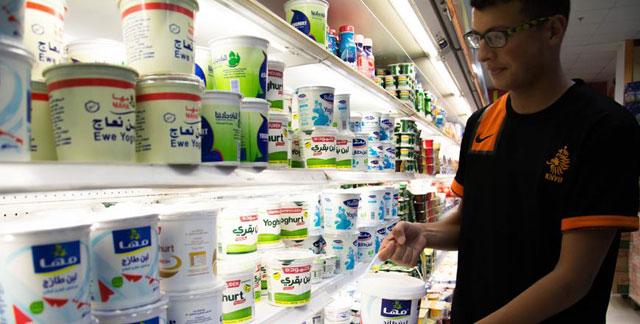Trade Ministry study shows decline in prices of reduced-tax commodities

The Jordan Times
AMMAN — A study conducted by the Ministry of Industry, Trade and Supply has shown a decrease in the prices of a number of food items and other basic commodities included in the Cabinet’s recent decision to reduce sales tax on certain products.
The ministry’s study follows a similar one conducted by the Jordan National Society for Consumer Protection, which revealed that several weeks after the Cabinet’s decision was put into effect, none of the 76 commodities' prices had been reduced.
The comparative study, which tracked changes in the prices of 96 commodities, among which were those included in the government’s recent decision, showed an almost 8.2-per cent increase in the prices of 18 food and home commodities, no change in the prices of 76 commodities and a decrease in the prices of only two commodities.
However, Minister of Industry, Trade and Supply Tareq Hammouri said in a press statement: "Our monitoring teams have indicated the beginning of a decrease in the prices of some commodities in the local market.”
He pointed out that some dairy companies have abided by the decision and reduced their prices, as well as markets of civil and military consumer institutions and a number of malls.
“We have contacted factories, merchants, owners of malls and civil and military consumer establishments to discuss the implementation of the Cabinet’s decision and the necessity of adhering to all Cabinet decisions,” said the minister.
The statement noted that the ministry, through supervisory field tours, will continue to monitor the prices of all commodities — especially those covered by the decision to reduce sales tax — stressing that, in the event of non-compliance with the decision, the ministry will apply the Trade and Industry Law by setting price caps during the coming period.
The ministry monitors the prices of the various basic, food and catering commodities on a daily basis in all regions of the Kingdom, and analyses these prices in terms of decline, rise and stability.
Hammouri said that low price offerings in these sectors are in the interest of both the government and citizens, and therefore it is “necessary that various commercial sectors comply with this decision”.
The Jordan Chamber of Industry confirmed in a press release issued on Monday the commitment of Jordanian dairy factories to implementing the government decision to reduce sales tax.
The chamber reiterated that the government's decision to reduce the sales tax from 10 per cent to 5 per cent and from 4 per cent to 2 per cent on many basic commodities "is in the best interests of both the consumer and the producer".
The chamber expressed the “cooperation of Jordanian factories and their understanding of the living conditions of Jordanian citizens”.
Salameh Mawazeen, a milk producer who is a member of the Cooperative Society for Cattle Owners and Milk Producers, told The Jordan Times over the phone that “local dairy factories are committed to providing price offers on products in cooperation with various commercial centres to respond to the government's decision on the one hand, and to commit to our national role on the other”.
The chamber indicated that this commitment by dairy factories “comes in spite of the sector’s economic conditions and challenges represented by high production costs, high costs of raw materials and high costs of energy and transportation, in addition to the cost of labour, which seems to be heading towards an increase”.
Mawazeen called on the government to look into the sector’s conditions and try to lower costs and create incentives for its stakeholders, as it is "always one of the first sectors to respond to the Cabinet’s decisions".
Latest News
 King, Bahrain monarch stress need to maintain Arab coordination
King, Bahrain monarch stress need to maintain Arab coordination Security Council to vote Thursday on Palestinian state UN membership
Security Council to vote Thursday on Palestinian state UN membership Dubai reels from floods chaos after record rains
Dubai reels from floods chaos after record rains Khasawneh, Saudi Shura Council speaker discuss bilateral ties, regional developments
Khasawneh, Saudi Shura Council speaker discuss bilateral ties, regional developments Egyptian Foreign Minister condemns potential Palestinian displacement as 'war crime'
Egyptian Foreign Minister condemns potential Palestinian displacement as 'war crime'
Most Read Articles
- King, Bahrain monarch stress need to maintain Arab coordination
- Dubai reels from floods chaos after record rains
- Security Council to vote Thursday on Palestinian state UN membership
- Khasawneh, Saudi Shura Council speaker discuss bilateral ties, regional developments
- Tesla asks shareholders to reapprove huge Musk pay deal
- Jordan will take down any projectiles threatening its people, sovereignty — Safadi
- Hizbollah says struck Israel base in retaliation for fighters' killing
- Knights of Change launches nationwide blood donation campaign for Gaza
- Princess Basma checks on patients receiving treatments
- The mystery of US interest rates - By The mystery of US interest rates, The Jordan Times